|
|
|
Sort Order |
|
|
|
Items / Page
|
|
|
|
|
|
|
| Srl | Item |
| 1 |
ID:
158991
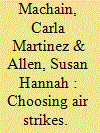

|
|
|
|
|
| Summary/Abstract |
Under what conditions do states choose to use only air power? Air strikes are one of many tools states use to promote their interests in the international system. Given that not all policy tools are appropriate for all crises, we explore when states choose to use air strikes as a coercive tool. We empirically test both common perceptions and newly derived hypotheses on the characteristics of states that employ air-only campaigns and the settings in which they do so, using newly collected data on the uses of air power during international crises between 1908 and 2006. Looking at the events that trigger the crises and the salience of the issues at stake, alongside the characteristics of the states involved, provides a clearer picture of when states use air power versus other coercive tools. Our research indicates that air-only campaigns are more likely to be initiated by militarily powerful states, but that in higher stakes crises, states are more likely to use ground troops or ground and air forces in combination.
|
|
|
|
|
|
|
|
|
|
|
|
|
|
|
|
| 2 |
ID:
104053
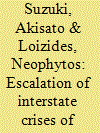

|
|
|
|
|
| Publication |
2011.
|
| Summary/Abstract |
This article examines the causation and extent of interstate crisis escalation among two conflictual dyads, namely Greece-Turkey and India-Pakistan. It draws from the International Crisis Behaviour dataset to present a new sub-dataset of 12 interstate crises involving the two dyads in the period 1987 to 2002. While crisis behaviour in Greece-Turkey has frequently been analysed within the context of two major regional organizations (NATO and the EU), Indian-Pakistani crises have been studied within the perspective of nuclear proliferation. To examine the linkage between these features and interstate crises, the article operationalizes the security dilemma and the diversionary theory of war through a probabilistic model. Using Ragin's (2000) comparative qualitative analysis, it demonstrates that both the security dilemma and diversionary theory explain crisis escalation, although the latter covers more cases with a smaller margin of error. Moreover, the article demonstrates that Greek-Turkish crises have generally escalated to relatively low levels of conflict (threat of war or show of force), while Indian-Pakistani crises have spiralled to higher levels of confrontation (use of force). In both dyads, nuclear weapons and regional organizations have shaped the boundaries of possible escalatory action. The EU and NATO have contributed to mitigating crisis escalation and the use of force between the Aegean neighbours, while unintentionally encouraging low intensity confrontations; meanwhile, in South Asia, nuclear weapons in combination with fragile domestic regimes have exacerbated crises, particularly in the form of state-sponsored unconventional warfare.
|
|
|
|
|
|
|
|
|
|
|
|
|
|
|
|
| 3 |
ID:
185164
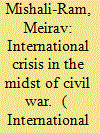

|
|
|
|
|
| Summary/Abstract |
This article examines the nexus between international crises and civil wars. Based on the premise that not all simultaneous civil and international conflicts are related, the study aims to explore the circumstances in which civil wars affect violent escalation in international crises. The study identifies ‘composite’ crises – where the civil war is the core issue of the international dispute – as a unique subset of international crises. These crises are distinguished from ‘unrelated-civil war’ situations, in which the issues in the internal and international conflicts are separate. Using data from the ICB, COW, and UCDP/PRIO datasets, the article tests a dual-conflict argument, positing that interconnected issues and interactions between actors in composite situations inhibit moderate crisis management and aggravate interstate behavior. The findings show that while civil war in composite situations has a negative impact on crisis escalation, unrelated-civil war has an inverse impact on interstate relations in crisis.
|
|
|
|
|
|
|
|
|
|
|
|
|
|
|
|
| 4 |
ID:
158994
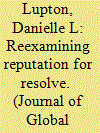

|
|
|
|
|
| Summary/Abstract |
Scholars remain conflicted over the effects of reputations for resolve on international conflict and which actors acquire these reputations. I address this debate by examining how our measures of resolve, as well as where we look for its effects, influence our conclusions about its impact on international conflict. Using data from the Archigos dataset and the International Crisis Behavior dataset, I perform a semi-parametric Cox survival analysis and directly compare the effects of resolute and irresolute behavior at two distinct levels of analysis: the leader level of analysis and the state level of analysis. My results show that target leaders who employ relatively more violent or more severe major responses to dispute triggers enjoy significantly longer periods of time before being the target of a future dispute initiated by the same challenger leader. While I also find a similar effect for target states that employ relatively more severe responses, the impact of resolute behavior at the state level of analysis does not appear to be as consistently widespread as that of resolute behavior at the leader level of analysis. My findings also show that how scholars choose to measure resolve as a concept can have important implications for their conclusions about its broader effects. Finally, my analyses present evidence that both leaders and states may be capable of acquiring reputations for resolve, opening up interesting avenues of future research.
|
|
|
|
|
|
|
|
|
|
|
|
|
|
|
|
| 5 |
ID:
094625
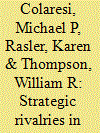

|
|
|
|
|
| Publication |
Cambridge, Cambridge University Press, 2007.
|
| Description |
xiv, 314p.
|
| Standard Number |
9780521707619
|
|
|
|
|
|
|
|
|
|
|
|
Copies: C:1/I:0,R:0,Q:0
Circulation
| Accession# | Call# | Current Location | Status | Policy | Location |
| 054832 | 327.1/COL 054832 | Main | On Shelf | General | |
|
|
|
|
|
|
|
|
|